Seek recognition, improve digestion
Abstract: I am proposing two broad classes of techniques for getting things done, together with examples of how to apply them to getting things done. These techniques work very well for me and can be specialized to a lot of different activities.
A popular idea goes: if you want people to be enthusiastic about an activity, gamify that activity. Add a leaderboard, add points for completing tasks, etc.
After observing how well gamification works, it is tempting to apply it to as many unenjoyable things as possible. One example is Habitica ("a free habit and productivity app that treats your real life like a game"):

Another example is StackOverflow, a Q&A site for programmers, with all of its reputation points and badges for achievements and so on. Reddit is doing something like that too. All sites with upvotes/downvotes and karma are doing it to some extent, actually, though StackOverflow goes further than most:
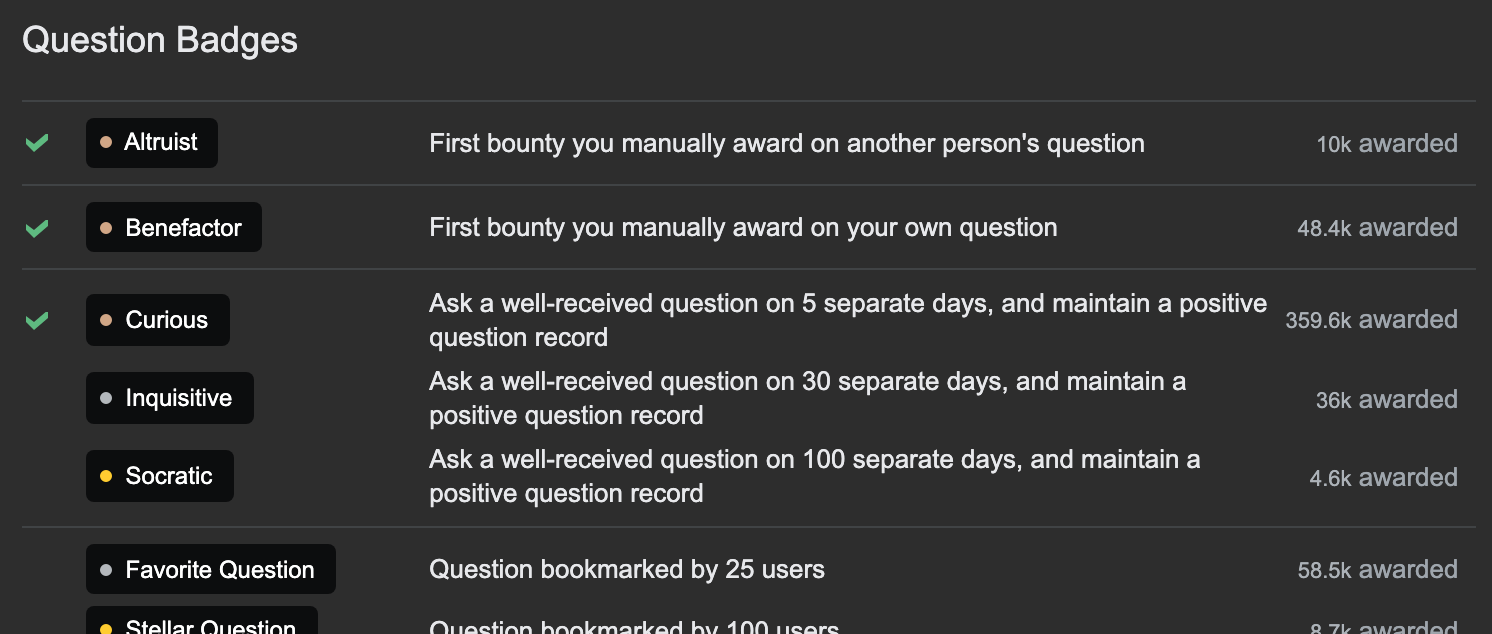
There are a bunch of components in gamification, but I am going to talk about the two huge ones that have the biggest effect on me specifically. Furthermore, they have nothing to do with games. Further-even-more, they are usually shitty. You can do better.
Here's how.
Component A: recognition
The first of the two components is recognition—of your achievements, progress, and status.
- Macro-level: when you are doing well, your score is high.
- Micro-level: when you do something good, you are immediately rewarded (with a badge or whatever).
The problem with gamification is that this recognition usually sucks. It sucks in two ways: a) it doesn't recognize some of your achievements, and b) it is impersonal, done either by humans who don't care about you, or by the game itself.
The result is that you are only partially fulfilled. The difference between personal and impersonal feedback is the same as the difference between replies on Twitter and likes on Twitter. Or between sex and masturbation.
if you actually give people what they want they might not come back, but if you 10-50% give people what they want and continually promise in a bunch of little ways that they'll get more then you can create a customer for life
The problem, of course, is that you might need gamification because you don't have many people who can give you real recognition to begin with. So the choice is between fake recognition and nothing, and without the motivation coming from fake recognition you will not [become more attractive in some way] and won't find anybody who can give you recognition. Cursed problems strike again.
There is no solution here other than to use fake recognition while keeping in mind that the eventual goal is real recognition. At some point you'll get there, if you keep noticing the small opportunities that open up every once in a while:
- Hearing that a friend is also learning to play the piano, and being brave enough to show him what you've learned.
- Or putting the recording on YouTube even though (you think) nobody is going to watch it. Here's mine playing piano and playing Beat Saber.
- Or asking "what did you think about my post?" instead of... not asking.
- Or saying in a work chat that you've learned about [a cool thing], despite it not being particularly on-topic.
- Or talking about your life while working on a task with somebody else.
- Or making a Twitter thread with status updates on how far you have gotten in [a task]. Here's mine on tidying up the apartment.
- Or, hell, just asking somebody "hey, can you watch over me in a Zoom call while I'm cleaning up my room?". At least for me it works very well. Nowadays I am trying to do as many things as possible while on a call.
Component B: improving digestion
The second component that should be split out of gamification is improving digestion—breaking tasks into chunks, finding easy ones, and showing you that there is a viable path to achieving the goal. Without a viable path to the goal, you don't want to do anything. Gamification either lays out the path, or at least makes you focus on the first steps rather than the end goal.
The funny thing is that you are absolutely capable of breaking down tasks into chunks in a way that would work much better than what gamification usually does—and you can do this for any task, not just the one that happens to have an app available.
Tidying up
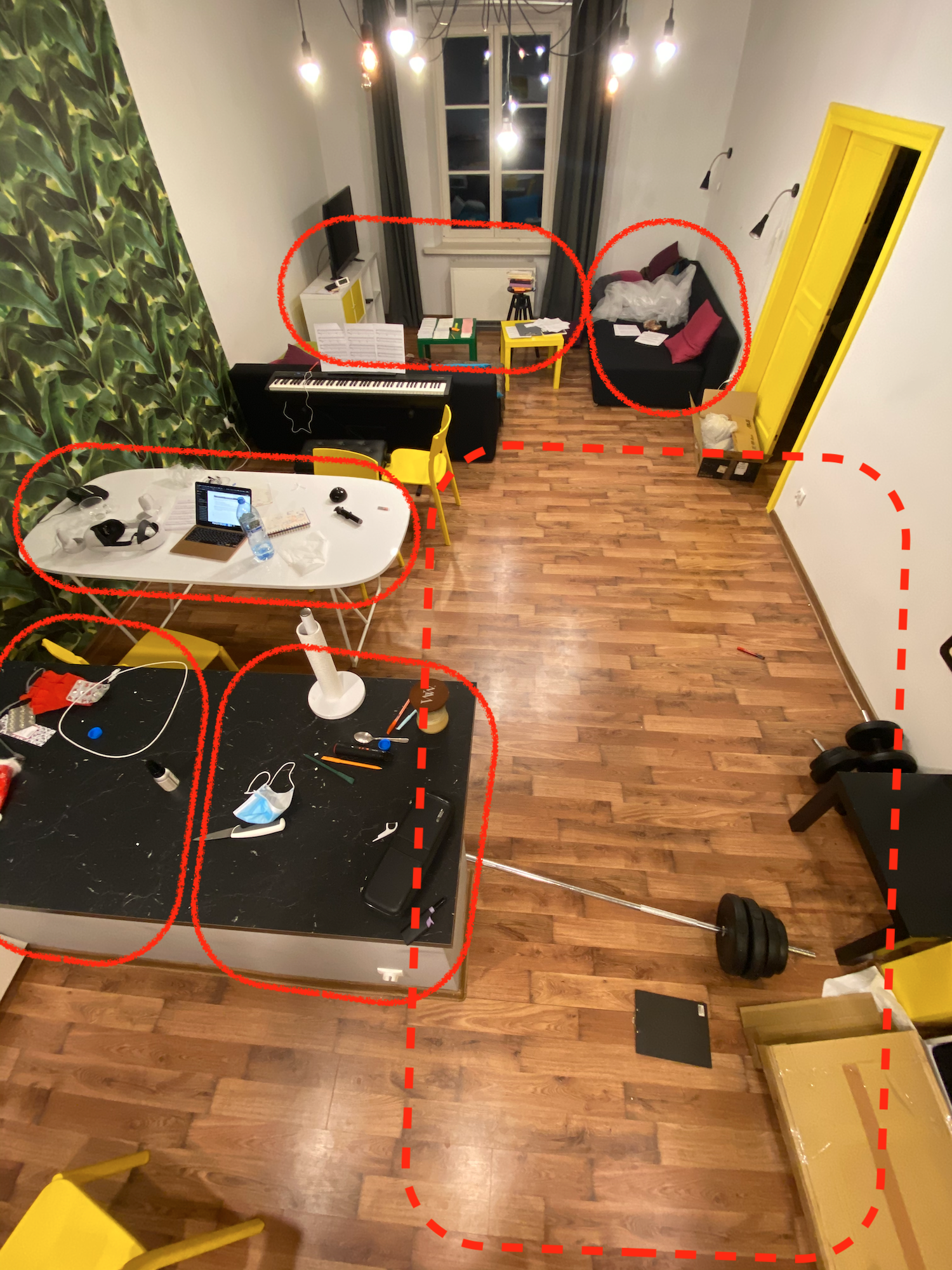
Here is a messy apartment.
How to make it less messy? Break it into zones, then tidy up each zone.
Why is the floor zone bigger than the other zones? Because I know myself. I am not a dimwitted app. I know the floor is easy, and I also know the kitchen island is hard—this is why the kitchen island is split into two zones. If I treat the kitchen island as a single zone, I might give up. So I won't.
Maybe the zones don't work. Maybe the messiness accumulates too quickly. It usually does, actually.
If I make things 20% easier for myself, maybe messiness will be accumulating slower, and not faster, than I am able to deal with it. How can I make things 20% easier?
I bought a label maker, Brother PT-D210, for $50. I chose a shelf and labeled it with "Read books" and "Pens notebooks etc". Now there are two categories of things that won't be lying around elsewhere in the flat, because that shelf is their rightful place. If you make 15 labels and not two, 70% of your tidying-up process will consist of "find all things from category X and put them where they belong", which are boring but easy tasks.
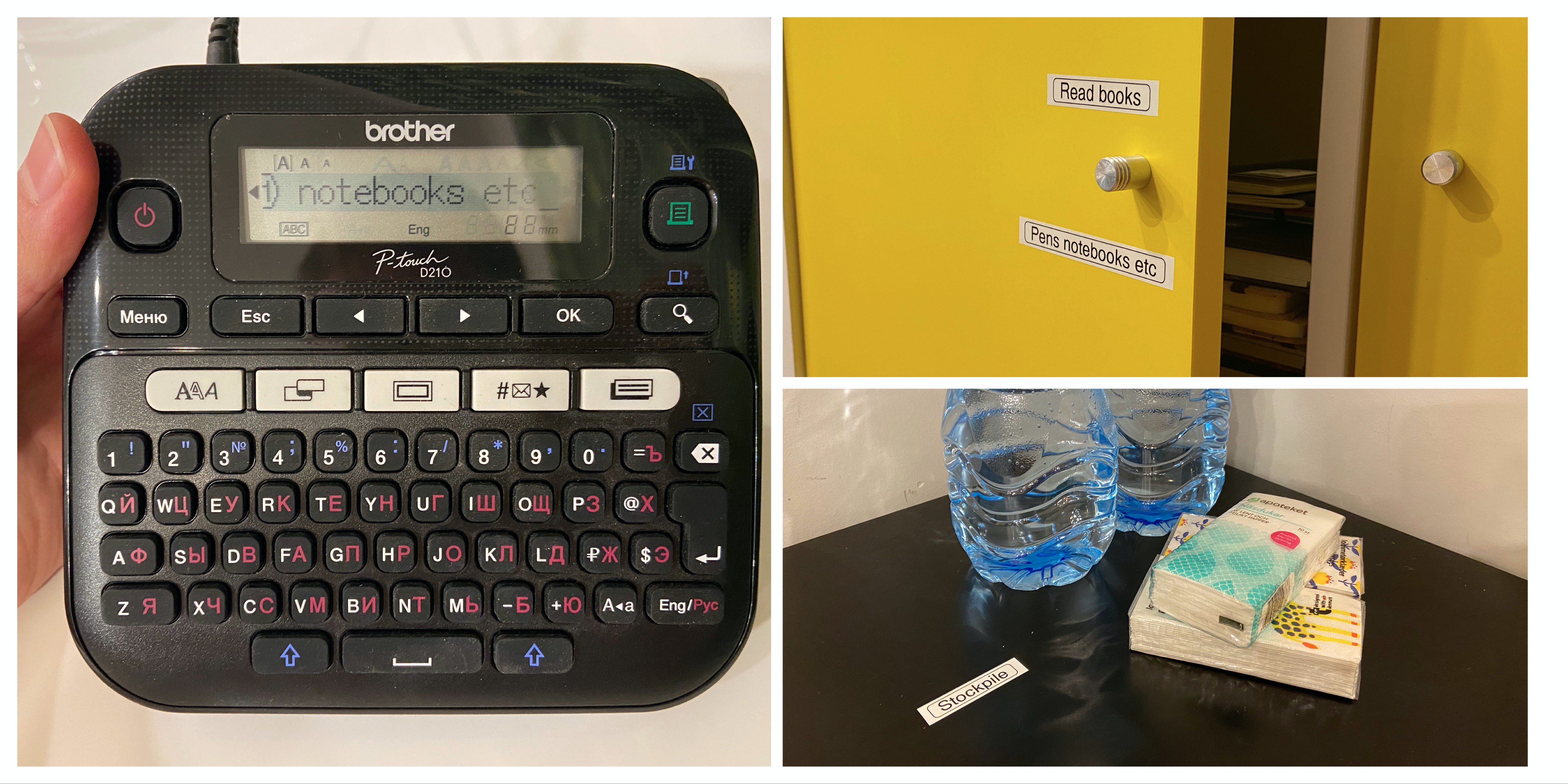
I can also add recognition into the mix. When I'm done with the pens and notebooks, I can whirl around and shout "aha, all pens and notebooks are locked away, HA HA". I don't need to muck around with an app to create recognition.
Side-note: was I born with the label maker in hands? No, I stumbled upon the very concept of a label maker while working in Germany. Previously I didn't even know they existed. My point here is not "magically know about things", but "recognize opportunities for improving digestion when they arise".
Tasks, tabs, and email
The same principle can be applied to the most accursed problems—tabs and emails. You have a shitton of inboxes: email, the notification drawer on your phone, work chat, every messaging app ever (especially if it has a "mark as unread" button). You also have a shitton of todo lists: tabs, possibly an actual todo app, possibly email again.
The process of digestion is messy and painful. Email in particular mixes ridiculously easy tasks (archive a spam email) with ridiculously hard tasks ("your PayPal account has been blocked", what do you do now?). You feel bad about the hard tasks, and so you don't want to look at the easy tasks, and so the easy tasks are not getting done, and now you have evidence that you can't even do the easy tasks, and you are convinced that you suck.
There are many solutions here that can make your life 20% easier. For example: use a calendar for tasks that have a specific time, that you don't feel bad about, and that you will actually do once reminded. Now 20% of the tasks are gone! They are in the calendar. The rest of your life might be shit, but at least you're staying on top of your calendar.
Side-note: this is why you generally shouldn't use productivity apps to force yourself to do things. You are spoiling the digestion of easy tasks by adding hard tasks to the mix. This might break the digestion of easy tasks.
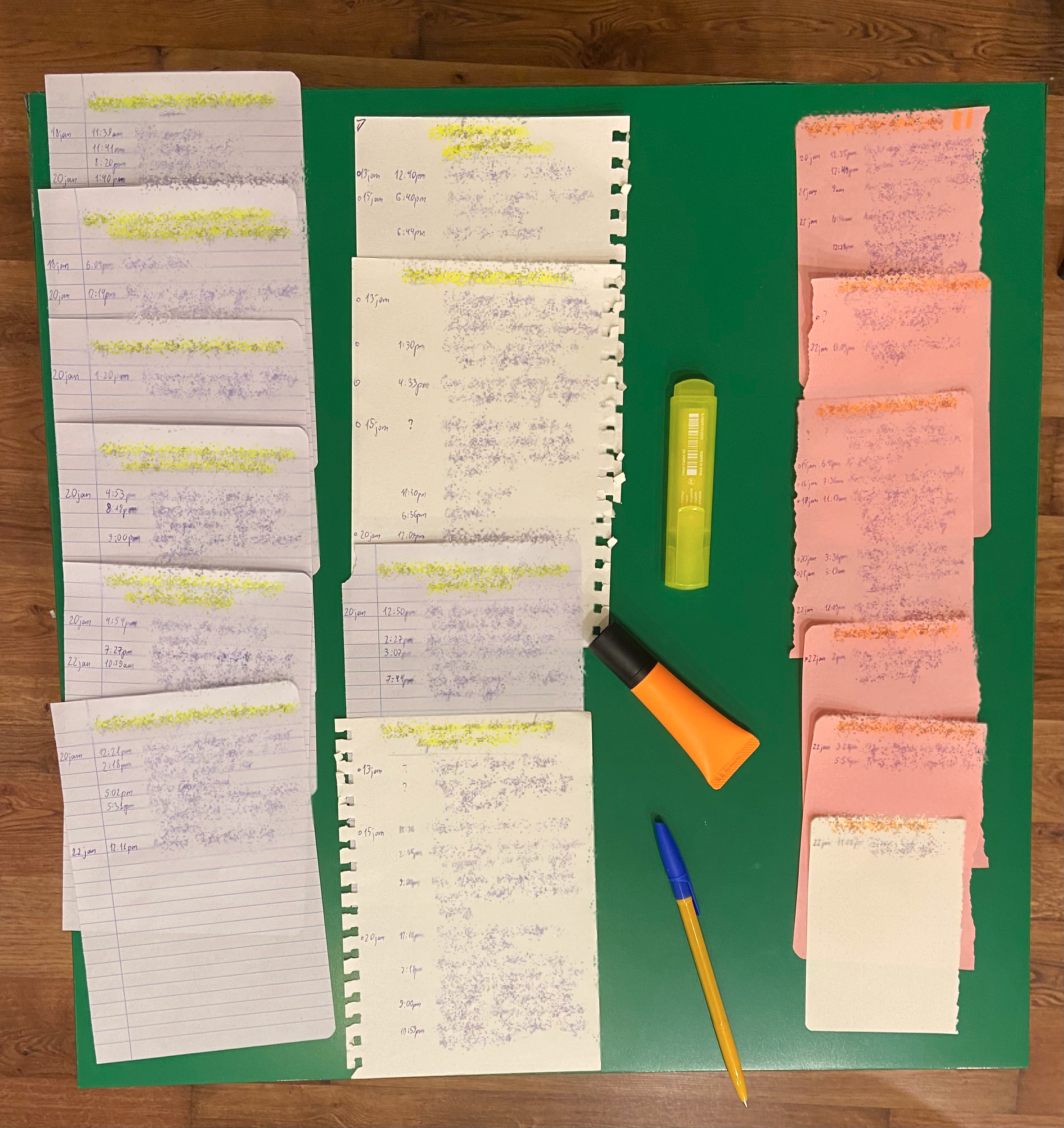
Another thing that is working very well for me is taking all the annoying tasks where I have to do some kind of back-and-forth, and literally keeping them on a separate table, together with logs of what's the current status of the back-and-forth. Here's an example:
- 15jan 9am: asked [coworker] about the status of [task]
- 15jan 3pm: pinged him again
- 16jan 9:30am: he replied and said I should talk to [another coworker]
- 16jan 9:40am: wrote to him
- 16jan 9:45am: he said he's working on it
- ...
A friend has a different strategy: whenever she's faced with a back-and-forth, she tries to make it so the parties can talk without her. "Here is a fresh group chat, please figure it out between yourselves".
Yet another way to improve digestion is to make tasks location-dependent. Your job is offering you a work laptop? Take it even if you don't need it. Keep everything work-related on it. Keep the laptop in the office and don't bring it home. Intentionally make it hard for yourself to work from home—don't set up sync, etc.
I work from home and I have two laptops anyway, exactly for that reason. ANYTHING FOR THE GOD OF 20% IMPROVEMENTS. Actually, even 5% improvements are good. Really. Really really really. They are.
Jira and Complice
Complice is an app that does "improving digestion" pretty well, while not being gamified almost at all. You create goals ("learn Chinese", "be happier", whatever). Then, every day, you set intentions:
LEARN CHINESE: Spend 20 minutes studying
BE HAPPIER: Talk to [a friend]
BE HAPPIER: Buy a fiction book
When you complete one of the intentions, you mark it off. That's it. (There are also monthly reviews etc, but I am not going to talk about them.)
Complice does "focus on small steps rather than the overall path" very well, and setting goals also means that at least some of your tasks now belong in Complice. This is like labeling a shelf "pens and notebooks". Devilish. (Complice also has coworking rooms which might be good for recognition.)
However, a thing that works even better for me is Jira. The famous enterprisey issue tracker thingy. Here's how it works.
I have a roadmap with tasks that belong to categories. Just like Complice, except that I'm allowed to write tasks for the future, too:
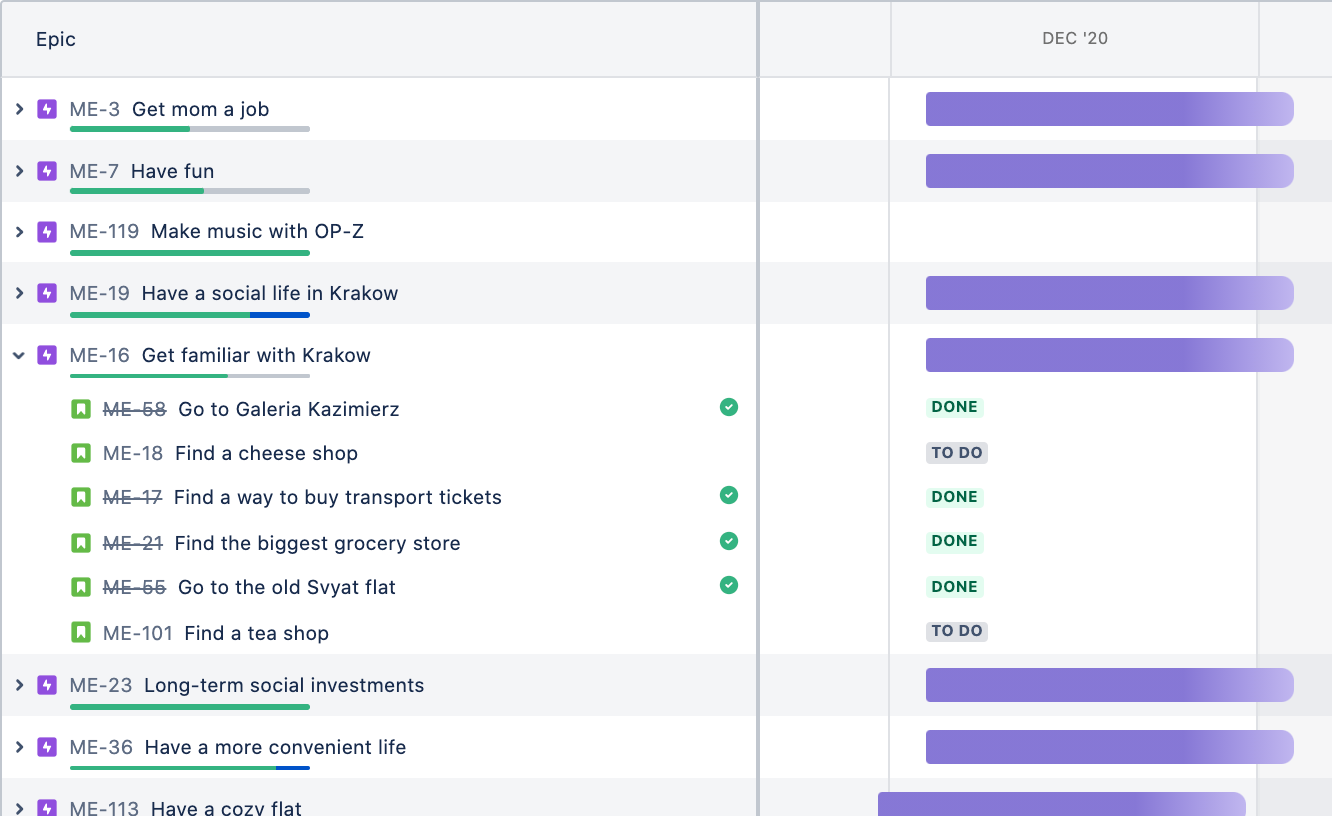
Every week, I choose a set of tasks for the week, called a sprint:
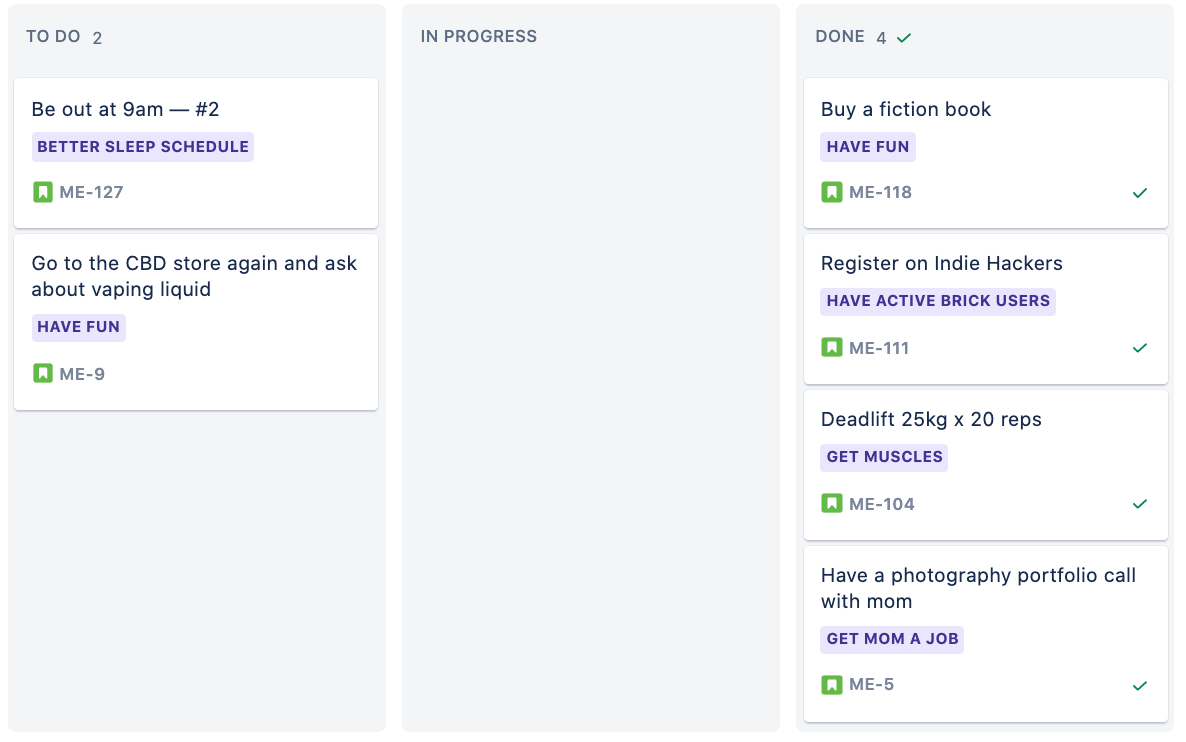
Then I aim to do all the tasks.
Having week-long sprints instead of Complice's day-long sprints works wonders:
- I don't have to feel bad about "aargh I have to do all these things today". I can do nothing today and feel fine, because I'm confident that the overall set is easy enough that I can still get it done in a week.
- I can include tasks that will take more than one day. (I.e. if I can digest bigger chunks, Jira lets me grab bigger chunks.)
- All tasks related to [a certain area] can truly live in one place, and not leak out and pollute the rest of my life. Combining planning and execution actually works well here. Complice avoids planning, as far as I recall, while Jira doesn't.
(It's been a while since I tried Complice, so perhaps try both and see what sticks. Complice is definitely much more lightweight, but at this point Jira is working better for me.)
The giant board for noticing things
I have a lengthy post on it: The best self-improvement trick so far: a giant board. The idea is that by demonstrating to yourself that things can get solved, you automatically increase the size of the chunk you can grab, because you already know that sometimes things get solved even if they feel unsolvable. This gives you hope, and hope helps with digestion, a lot. Go read the post.
Conclusion
SEEK RECOGNITION
IMPROVE DIGESTION
SEEK RECOGNITION FROM ACTUAL PEOPLE
IMPROVE DIGESTION BY ZONING AGGRESSIVELY, BY KEEPING TRACK OF EVIDENCE THAT YOU CAN GET STUFF DONE, AND BY GRABBING EVERY SMALL IMPROVEMENT YOU CAN GET
Thanks.